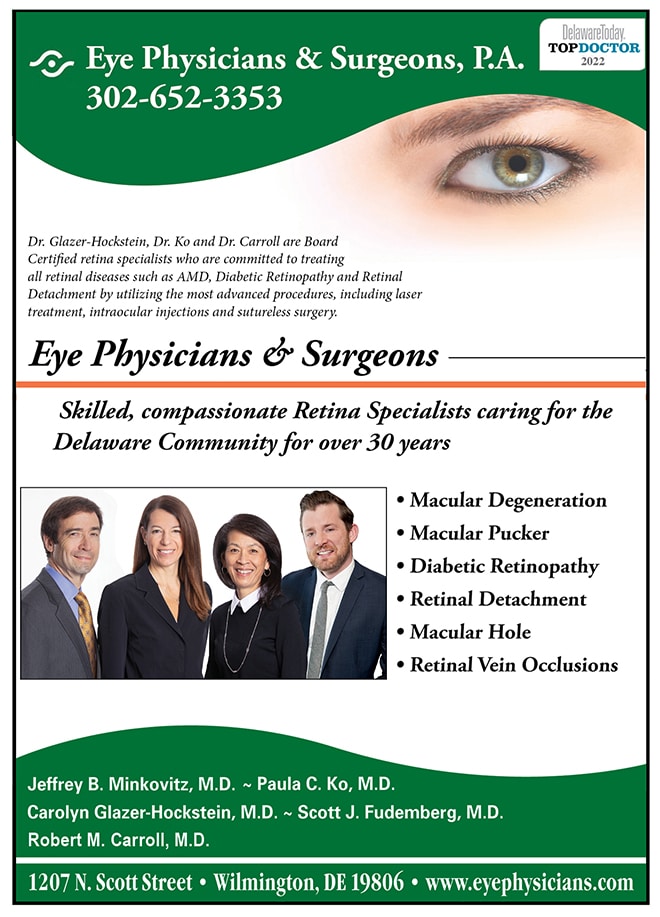It’s A Bird, It’s A Plane, It’s . . . A Floater?
By Robert M. Carroll, M.D.
One of the most common symptoms that brings patients to see retina specialists is sudden onset of “little bugs,” “black dots,” or “wiggly lines” moving around in their vision. These are all different descriptions for what are commonly referred to as floaters. However, what causes these and what should you do if you experience them?
The inside of the eye is full of a gel-like substance called the vitreous and the back of the eye is lined with a nerve tissue called the retina. As the eye ages, the vitreous gel starts to shrink and shrivel and eventually will separate from the back of the eye. This is called a posterior vitreous detachment (PVD). It is a normal change that happens to everyone, most commonly around the age of 60. With the vitreous separated, it can move around more freely inside of the eye and small pieces of shrunken or hardened gel suddenly appear in your vision as floaters. Some patients also experience flashes of light or a cloudy haze moving across their vision during this time. A PVD does not cause pain and is not something you “feel” but is instead something you “see.”
If this is all a normal change, then why do you need to care about it? The most concerning complication that can develop at the time of a PVD is a torn retina. The vitreous gel is sticky, and as it separates from the back of the eye it may pull too hard and tear the retina tissue. A retinal tear is concerning because if not detected and treated early enough, it can cause a retinal detachment, where the entire retina comes off the back of the eye and can lead to irreversible vision loss.
About 1 in 10 patients who experience a PVD will develop a retinal tear, which is why it is important to see a retina specialist as soon as possible if you develop new-onset floaters, flashes, or a dark curtain or shade covering part of your vision. Your retina specialist will dilate your eyes and examine your retina with bright lights while sometimes pushing lightly on your eyelids to look hard for any retinal tears. If a retinal tear or detachment is found, your retina specialist may recommend one or more treatments. If no retinal tears are seen, they may still recommend additional follow up exams, as this is usually a dynamic time period for the eye and retinal tears can still develop. While the floaters and flashes may be annoying, fortunately most patients do not develop any complications and the symptoms go away on their own over a period of weeks to months. There is no medication or eye drops that will prevent a PVD, prevent a retinal tear, or make the floaters go away faster.
Certain patients are at a higher risk than others to develop a retinal tear during a PVD, such as those who are very nearsighted, have a family history of retinal tears or detachment, or have a history of eye trauma. Floaters and flashes can also occur for reasons other than PVD, such as complications from diabetes or high blood pressure that can also lead to vision loss if not detected. Therefore, if you experience a sudden onset of floaters and/or flashing lights in your vision, you should seek a dilated eye exam as soon as possible. For more information or to schedule an appointment with a retinal specialist at Eye Physicians and Surgeons, please call 302-652-3353 or visit www.eyephysicians.com.
follow us on facebook & instagram
Bio
We are very excited to announce our newest retina specialist at Eye Physicians and Surgeons, Dr. Robert Carroll. Dr. Carroll is a board-certified, fellowship-trained vitreoretinal surgeon who specializes in the care of diabetic retinopathy, age related macular degeneration, retinal vascular disease, and posterior uveitis as well as small-gauge sutureless surgical repair of retinal detachment, macular hole, complex diabetic pathology, and secondary intraocular lenses.
Dr. Carroll completed his undergraduate degree in biochemistry with honors at the University of Notre Dame and earned his medical degree at Rutgers-Robert Wood Johnson Medical School. He completed his internship at Albert Einstein Medical Center in Philadelphia, residency in ophthalmology at Mount Sinai Hospital in New York, and fellowship in vitreoretinal surgery at the Scheie Eye Institute of the University of Pennsylvania, where he was awarded the Fellow Excellence in Teaching Award.
Please join Eye Physicians and Surgeons in welcoming Dr. Carroll to our practice!



